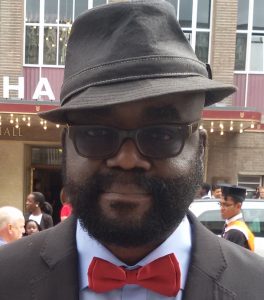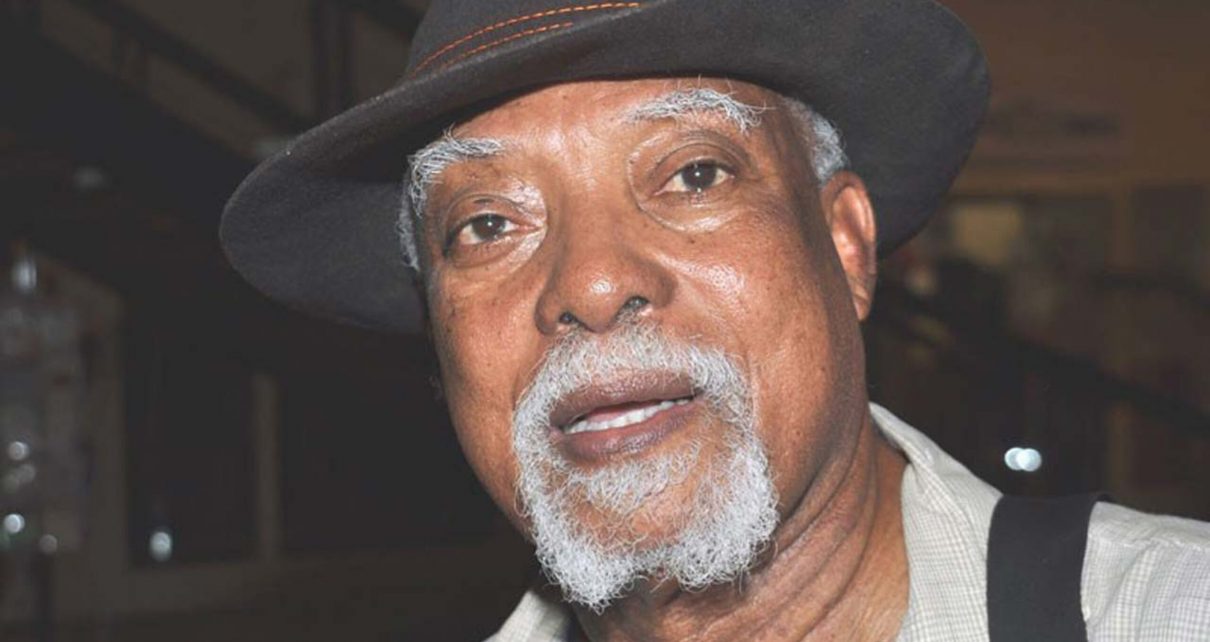
IT IS IMPOSSIBLE NOT TO be affected by contact with Lindsay Barrett, the poet, journalist, essayist, photographer, playwright, broadcaster and novelist. This rolling stone has gathered moss aplenty, having packed so much into his four score years with indelible footprints in Europe, the United States and Africa.
I first met Barrett in the glorious 70s when Nigeria was a freelancer’s haven where one could write for radio, magazines and newspapers at the same time. I had the opportunity of writing and recording daily meditation pieces for the religious broadcast unit of Radio Nigeria, headed by Rev Fr Michael Omisesan, and at the same time participated in several radio plays. The established ‘lords’ of the radio play manor were the Barretts and the John Chukwus. Even at that time, there was something about the Jamaican’s generosity of spirit that made you feel you had known him all your life.
Barrett has been a participant in most of the defining moments of Nigeria’s development. While there are a few of his peers in the journalistic field who are still in circulation, there is certainly none with his potpourri of talents, literary output and international exposure.
Providence cast a spell of adventurism on Barrett early in life. Were novelist Cyprian Ekwensi to describe him at the onset of his epic adventure when he left Jamaica for London as a 21-year-old freelance journalist, Ekwensi would have said Barrett had caught ‘sokugo’, the wandering sickness in Ekwensi’s Burning Grass, which “turned studious men into wanderers, that led husbands to desert their wives…”
But, in truth, the seed of adventure had been planted in him from high school, the Clarendon College in Jamaica, where the Ghanaian pan-Africanist, Dudley Thompson, had lectured the students on the need for Africans in the Diaspora to link up with their roots in Africa.
After a stint as reporter with the Daily Gleaner and The Star from 1959 to 1961, he worked as news editor for the Jamaican Broadcasting Corporation before relocating to London where he freelanced with the BBC World Service and the Transcription Centre. He later travelled as a journalist through many European countries. His creative Muse was at its most active between the 60s and 70s. “Song for Mumu”, his first novel, written between 1962 and 1966, was published by Longman in 1967 to high critical acclaim. Reviewer A.R. Chisolm described it as “violently, lyrically, movingly original: A primitive masterpiece!”
He could not resist the allure of West Africa after participating in the first World Festival of Black Arts and Culture in Dakar, Senegal, in 1966. He landed in Nigeria after the festival and the enchantment of Africa’s biggest nation and the unique and vibrant diversity which ensures that there is never a dull moment, for good or for ill, has held him captive since then.
From 1966 to 1967 he was the Secretary of the Mbari Artists Club in Ibadan. During the war years, Barrett covered the tragic events from the frontline. His byline graced the pages of many Nigerian and foreign media. Because of the trust the authorities placed in him, he was appointed Director of the East Central State Information Service under Administrator Ukpabi Asika.
He took a breather from Nigeria between 1971 and 1973 when he returned to London. However, Nigeria always had a pull.
He has collaborated or interacted with many notable literary icons: Wole Soyinka, Langston Hughes, Christopher Okigbo, JP Clark, Lebert “Sandy” Bethune, Ted Joans, Beauford Delaney, Gabriel Okara and Herb Gentry, Ulli Beier, among others. As a correspondent of the London-based West Africa magazine, he travelled widely in West Africa, especially to Ghana, Sierra-Leone, Liberia where he also found time to participate in literary workshops and deliver lectures.
A decade ago, Barrett himself took stock and said of his rich writing adventure:
“I can remember a time in my early twenties when I lived in London, Frankfurt, Paris, and Tangier and, for a while, in Tunisia and Libya; when I genuinely lived in a whirl of such oblivion that it appeared unlikely that I would ever witness my thirtieth birthday. For this reason I wrote at that time like one possessed and I still believe my work of that period represents the high points of my creative output. …”
The significance of Barrett’s odyssey in Africa lies in the interconnectedness he has been able to establish between the Caribbean and Black Africa. Thanks to Barrett, we now know that Mother Africa can indeed open her arms in warm embrace to receive her long lost children from the Diaspora and take advantage of the talents of such children to leapfrog the society to new possibilities.
Barrett is no longer a Jamaican immigrant in Nigeria. He is family. He left his family in Jamaica only to find family in Africa. That was underlined by his naturalisation as a Nigerian citizen in the mid-80s. With 11 children and 12 grandchildren, his feet are firmly planted in Nigeria. He is a Bayelsan, a Niger-Deltan by choice. Nigeria has finally succeeded in domesticating the adventurous sojourner!
Having lived such an eventful life during which he had a front row seat in reporting the Nigerian story and making the acquaintance — and even friendship —of several of the country’s leaders and social elite, perhaps Barrett would want to share his impression on these and more? I visited with him, armed with nine questions requesting terse answers.
PHILOSOPHY OF LIFE: Live and let live. Treat the next man as you would want him to treat you.
YAKUBU GOWON: It was General Gowon’s genuine desire for peace and equity after the war that I remember him for. Gowon won the war and was working towards winning the peace before he was overthrown. And we are yet to win the peace even now.
OLUSEGUN OBASANJO: Obasanjo is one of the most humorous and down-to-earth human beings I’ve ever met. But be careful, his native intelligence is of a very high order.
TY DANJUMA: He’s the most loyal and helpful friend I’ve ever had.He is so devoted to principles or conduct that he considers correct. It’s remarkable that I’ve been able to maintain a friendship with him for more than 50 years.
GOODLUCK JONATHAN: He remains a very close friend. I don’t think history has understood the level of his contribution to Nigeria’s stability. I consider him the closest friend I’ve had in power. He’s the only truly non-military leader we’ve had since Shagari (President Yar’Adua benefitted from his brother’s military connections). When history is ready for full analysis, Jonathan will smell of roses.
FELA: He lived for his music. His music had universal appeal. He was one of the greatest things to come out of Africa.
MD YUSUF: He was Fela’s best friend. As Head of the E-Department of the Police force, he was a trough of vital information for the whole of West Africa during the Nigerian civil war. A very unassuming, incredibly fair-minded professional.
WOLE SOYINKA: Soyinka is the spirit of youth. If he lives to be 100, he’ll still be a young man. I interviewed Soyinka and JP Clark for the Transcription Centre in London when I was about 21 years old. They are both ahead of society. Soyinka will always be young because he’s always ready to defend principles related to the good of the larger society.
GABRIEL OKARA: I call him my father. He amazed me by his dedication to the very high standards that he set. Literature was his life. He wrote as if without writing he would die. His book that impressed me most was, “The Voice”.
CHINUA ACHEBE: Chinua was a humble and unassuming individual who was always interested in what young people thought about life. He was a genuine mentor to those coming after him and wanted society to be shaped by service to the people.
CHRISTOPHER OKIGBO: Chris impressed me with the intricacy of his linguistic originality. When I met him, the depth of his attachment to the spirit of national aspirations struck me. That the breakdown of trust in the society led to his demise I regard as a major aesthetic tragedy.
FAVOURITE BOOK: Ralph Ellison’s “Invisible Man”.
GREATEST POSSESSION: My family is my greatest asset. My forthcoming memoirs will explain all that.
As the Yoruba would say, Carlton Lindsay Eseoghene Barrett looks good because “people are his wardrobe”. The Jamaican-Nigerian has, all told, been the best export from the Caribbean to Motherland Nigeria in the last century. What remains now is for the Nigerian government to confer the country’s national honour on the most recognisable Jamaican-Nigerian on the surface of the earth.
Happy birthday, Lindsay B!
- Wole Olaoye is a public relations practitioner and a public affairs commentator and can be reached at wole.olaoye@gmail.com


